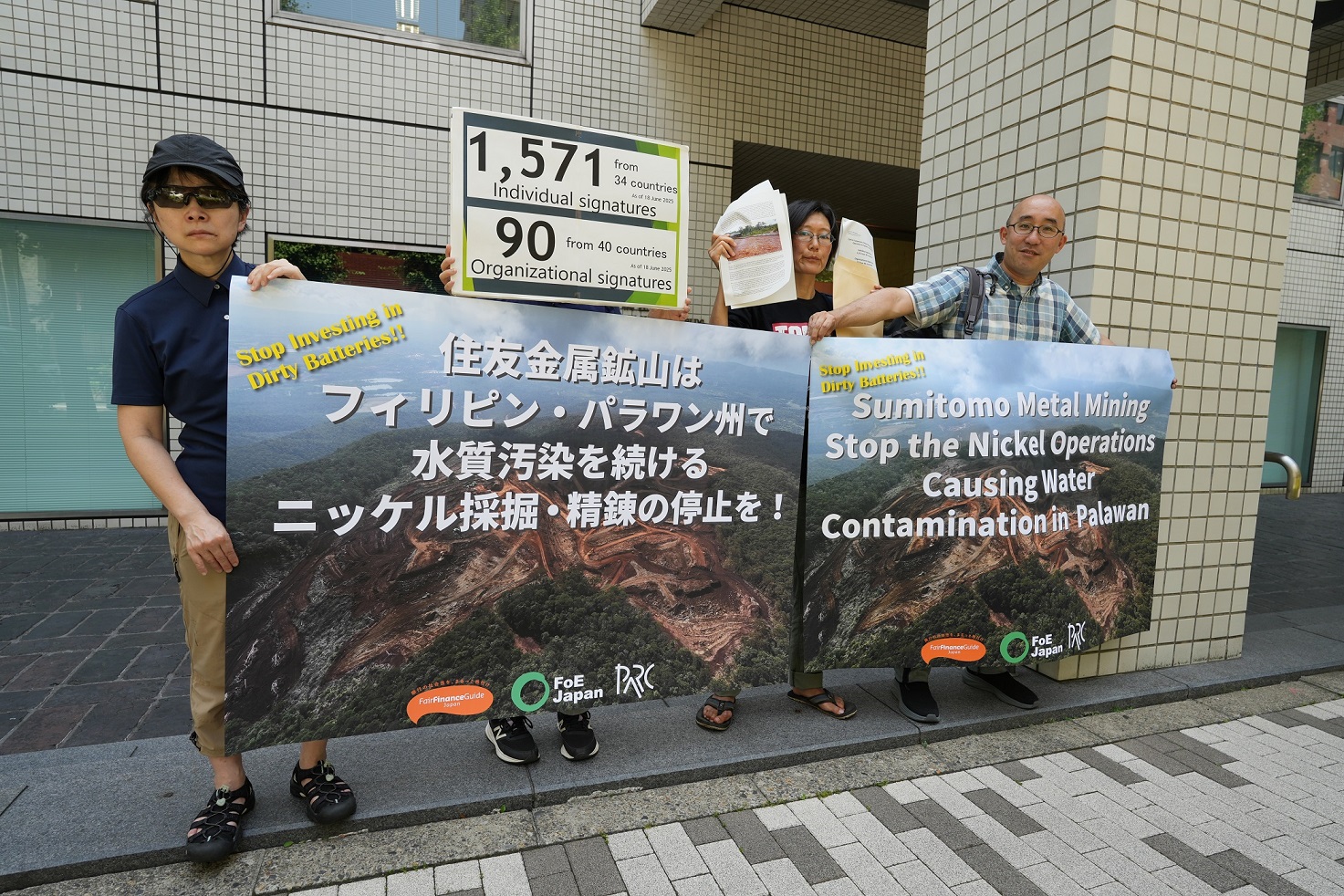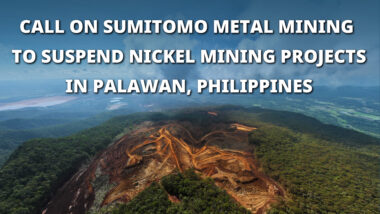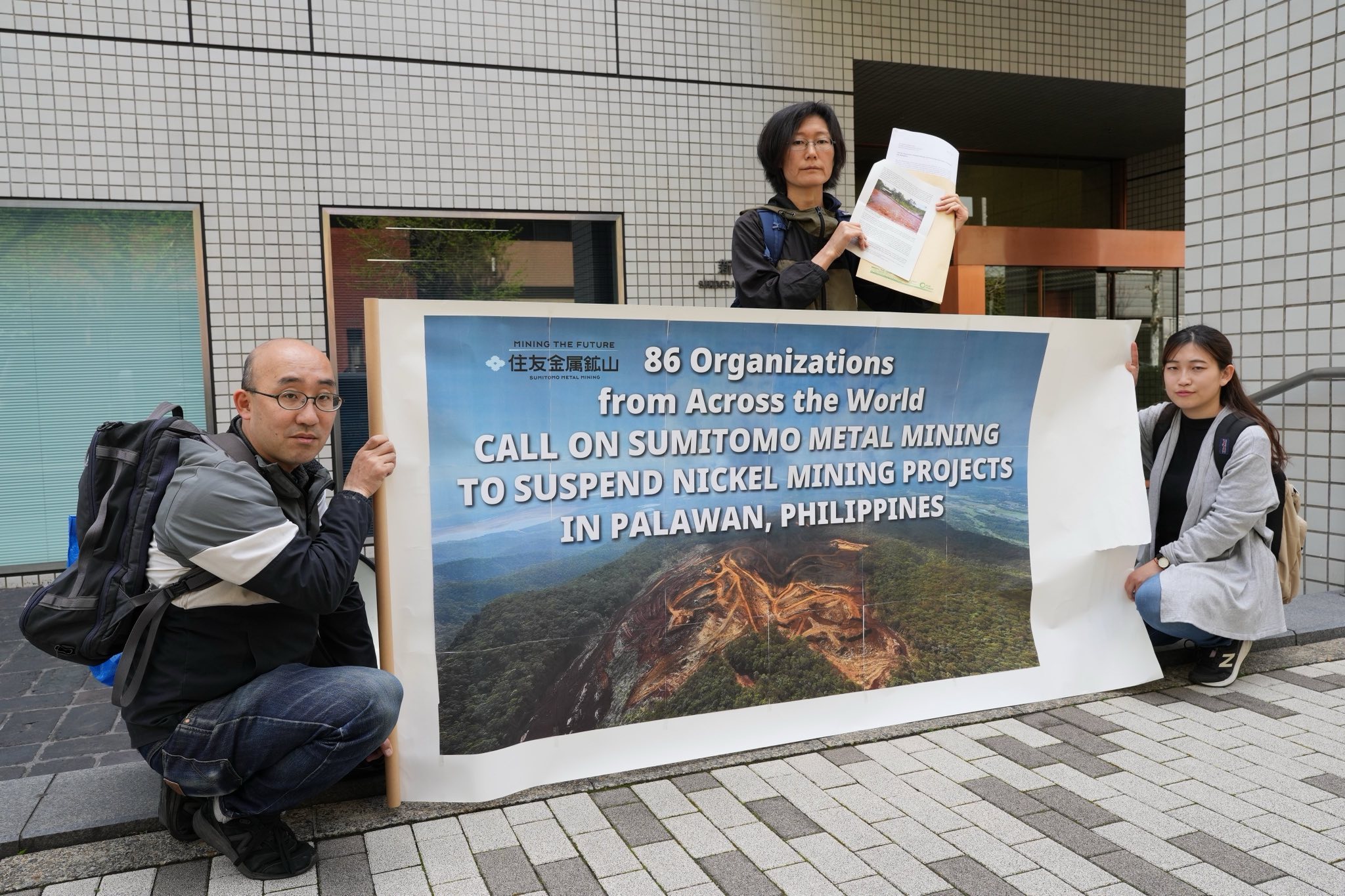Press Release: Environmental NGOs condemn Japanese mineral giant for disrespect of the international community
On July 28, 2025, Pacific Asia Resource Center (PARC) and Friends of the Earth Japan (FoE Japan) received a response from Pacific Metals Corporation (PAMCO) regarding a set of questions they sent on July 9, regarding PAMCO’s business dealings of deep-sea metallic resources obtained from the Area and expressed their concern at potential breaches of international laws and norms.
Question letter: https://files.parc-jp.org/docs/PAMCO_letter_20250709.pdf
Response: https://files.parc-jp.org/docs/PAMCO_response_20250725.pdf
The UN Convention on the Law of the Seas (UNCLOS), to which Japan is a Party, establishes that the International Seabed Authority (ISA), with its headquarters in Kingston, Jamaica, is the sole international institution tasked with the role of regulating and managing resource development permits regarding deep-sea mineral resources in the high seas. There is no other internationally recognized institution that can issue permits for deep-sea resource development in the deep seabed in areas beyond national jurisdiction, otherwise referred to as the “Area”. However, on April 24th, 2025, the US Trump administration signed an executive order on “Unleashing America’s Offshore Critical Minerals and Resources” and expressed its intent to issue permits for US nationals and US corporations to develop deep-sea mineral resources not only in US jurisdiction but also beyond its jurisdiction. This is a blatant disregard for international law. Though the US is not a signatory to UNCLOS, it is widely accepted that UNCLOS is customary international law and is thus binding even on non-member States.
Furthermore, The Metals Company (TMC) registered in Canada presented its intent to pursue permitting under the US laws for commercial resource development in the Clarion Clipperton Zone (CCZ) within the Area through its US subsidiary. The company currently has exploration contracts with the ISA obtained through internationally recognized processes. There is no justifiable reasoning to say they do not know or understand the role of the ISA. Therefore, this cannot be understood as anything but an intentional disregard for international law, and an act that is intended to undermine the international order managed through multilateral institutions.
Meanwhile, PAMCO is a Japanese company which has a history of partnering with TMC to develop processing technology specific to deep-sea nodules. TMC has repeatedly emphasized its partnership with PAMCO as justification material to demonstrate their capacity to utilize the nodules once obtained from the deep sea. The partnership relation has also been used to lure investments and financially benefit TMC. Even if PAMCO may not be mining the deep sea directly, it aims to provide the necessary technologies to TMC and therefore should be considered an accomplice to TMC’s mining activities.
PAMCO, in its response, claims that they do not understand TMC’s activities to be in violation of international law. However, this is far from the perspectives of the international community.
Upon the US and TMC’s announcements, the Secretary General of the ISA Leticia Carvalho criticized them for their negligence of the ISA’s role in the following comment:
“The United Nations Convention on the Law of the Sea, which serves as the legitimate multilateral framework for governing our Oceans and reflects general principles of international law and customary international law proclaims the Area and its resources as the Common Heritage of Humankind. A direct corollary of this legal status is that no State may claim, acquire, or exercise sovereignty or sovereign rights over any part of the Area or its mineral resources. This includes a prohibition on appropriation and alienation by any State, or by any natural or juridical person.”
Not only the Secretary-General, but also the ISA Council approved Resolution ISBA/30/C/19 at its meeting in July 2025. The resolution initiates an inquiry into the above situation. Underlying this is concern that TMC’s decision to apply for a permit in the US after conducting years of exploration under the ISA protocols can be in violation of the multilateral legal framework established by UNCLOS.
The ISA Council did not reach an agreement on the framework of international regulations during this term. The 38 countries that have declared their support for a moratorium or precautionary pause is clear evidence that the world is not prepared to move forward with commercial mineral development of the deep sea. Since States are required to regulate deep sea mineral exploitation in their own jurisdiction in line with international standards, this, in effect, can also be understood that the broader international community is not prepared to accept deep sea mining even within national jurisdictions.
Although TMC and its supporters claim that commercial mining of the deep sea is imminent, the state of international negotiations clearly indicates otherwise. Amidst this gap, it is undeniable that PAMCO’s international reputation will suffer. However, the problem does not stop with PAMCO.
Under Article 45 of Japan’s “Act on Interim Measures for Deep Seabed Mining” (enacted in 1982), anyone who knowingly and intentionally transports, stores, acquires (whether for compensation or not), or mediates or facilitates the disposal of ore obtained from the Area without the permission of the Minister of Economy, Trade and Industry shall be punished by imprisonment for up to five years or a fine of up to one million yen.
If PAMCO is not prosecuted for processing nodules obtained by TMC without the required contract from the ISA, this will be taken as an implicit endorsement by the Japanese government. Japan could then face the risk of international sanctions.
In the backdrop of heightened global trade tensions, sanctions or negative reputations regarding mineral supply chains can inflict significant damage to Japanese core industries such as electronics and automotives.
Shigeru Tanaka, director of the Asia Pacific Resource Center (PARC), criticizes PAMCO’s disregard of international laws as follows:
“The deep-sea mineral resource development currently being considered by TMC is likely to cause marine environmental damage at unprecedented scales. This will directly harm global fisheries and neglect the cultural rights of indigenous peoples in the Pacific who regard the deep sea as a sacred environment. Dismantling or endangering multinationalism will put the environment at risk”
Hikaru Matsumoto, human rights campaigner of FoE Japan, makes the following demand to PAMCO:
“PAMCO’s disregard for the concerns raised by the international community is unacceptable. The commercial mining being pushed forward by TMC can impact broad swaths of ecosystems and lead to massive losses of biodiversity. We urge PAMCO to recognize its corporate responsibility regarding this global environmental risk, and act accordingly”
Contact:
Shigeru Tanaka (PARC)
office@parc-jp.org / +81-3-5209-3455



